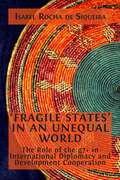- Table View
- List View
‘Fragile States’ in an Unequal World
by Isabel Rocha de SiqueiraThis is a book about people. ‘Fragile States’ in an Unequal World: The Role of the g7+ in International Diplomacy and Development Cooperation introduces the members of the g7+, a group formed by 20 conflict-affected states: why they came to believe in politics and policy; how they feel about their work, their family and their communities; and what they want to leave behind for the next generations It is the story of their personal and collective values, their mistakes, and the challenges they faced, and it will resonate with anyone who has tried to organize and work with a group of very different people.
هايدي
by جوهانا سبايريكان كوخ العم «وليم» ينتصب بشموخ فوق قمة الجبل . و هو في مهب الرياح من أي جهة جاءت و معرض لأشعةالشمس من مختلف جوانبه . و تر تفع خلف الكوخ ثلاث من أشجار التنوب . وقد جاوره كوخ آخر صغير مرتب و منظم مثله .
نَظّاراتُ الحَظِّ السَّعيدِ
by سارا لندنقصة فتاة صغيرة كانت تعاني من ضعف في البصر عرضها لسخرية أخيها وزملائها في المدرسة. تدوس بالخطأ ذيل القطة, وترى الكتابة على السبورة وكأنها ترقص على الجليد, أما في عيد ميلادها فهي ترى شمعة إضافية. وفي يوم من الأيام يبشرها والدها بأنها ستنال حظاً سعيداً, فتأخذ بالتساؤل حول مصدر ذلك الحظ السعيد إلى أن يأتي اليوم الذي يزورون به طبيب العيون والذي يخبرهم بأنها تحتاج إلى نظارات. وبمجرد أن ترتدي النظارات تتمكن من الرؤية بوضوح وتشعر بأنها بالفعل محظوظة لأنها أصبحت ترى الأشياء بشكل أوضح بكثير مما كانت تبدو عليه. وبالرغم من أنها تعلم بأنها مختلفة عن الآخرين, إلا أنها تشعر بالسعادة. إذ أنها بدلاً من مقارنة نفسها بالآخرين, تقارن نفسها بوضعها السابق حين كانت لا ترى بوضوح.
نظرية المحكمة الغير الملائمة - بحث الدكتور محمد الروبي
by Dubai Police Academyنظرية المحكمة غير الملائمة La théorie du forum non conveniens / Forum non conveniens doctrine نشأت ، وتطورت ، واستقرت ، في رحاب النظم الأنجلو أمريكية ؛ وذلك بغية سد الثغرات وتلافي العيوب التي تنجم عن إعمال قواعد الاختصاص القضائي الدولي المقررة في تلك النظم .
نظام الوساطة كبديل عن القضاء فى تسوية المنازعات ودياً
by Dubai Police Academyالوساطة Mediation هى مرحلة متقدمة من التفاوض تتم بمشاركة طرق ثالث أو من الغير، يسمى الوسيط، ويعمل على تسهيل الحوار بين الطرفين المتنازعين ومساعدتهما على التوصل إلى تسوية النزاع. إذن فهى آلية تقوم على أساس تدخل شخص ثالث محايد فى المفاوضات بين طرفين على خلاف، بحيث يعمل هذا المحايد على تقريب وجهات النظر بين الطرفين وتسهيل التواصل بينهما، واستنهاض أفكارهما، وطرح الرؤى، والخيارات أمامهما، وبالتالى مساعدتهما على ايجاد حل وتسوية مناسبة للنزاع تحقق مصالحها المشتركة.
نزهة المجالس ومنتخب النفائس
by الصفوريمن مشاهير كتب الرقاق يكاد يكون خلاصة لكل ماورد فيها من حكاوى الصالحين ونوادر اخبارهم
نحل العسل المعجزة
by يورغن تاوتزيمكن العثور على مجموعة من الصفات المشتركة بين الثدييات وخلية النحل فائقة التنظيم هذه الصفات أدت إلى هيمنة هذه الكائنات على غيرها من الحيوانات بحسب كل المعايير المعتادة يصنف نحل العسل من دون شك ضمن فئة الحشرات. والنحل يقع ضمن فئة الحشرات منذ حوالى 30 مليون عام. ومع ذلك فقد أدرج النحل ضمن فئة الفقاريات وذلك بدء ا من القرن التاسع عشر نتيجة لمقارنة رائعة أجراها النح ال والنجار الماهر يوهانس ميهرنغ (1815 - 1878). وبحسب ميهرنغ فإن خلية ( colony ) النحل هي كائن حي واحد يعادل حيوانا فقاريا تمثل العاملات أعضاء الجسم الضرورية للصيانة والهضم بينما تمثل الملكة والذكور الأعضاء التناسلية الأنثوية والذكرية





















